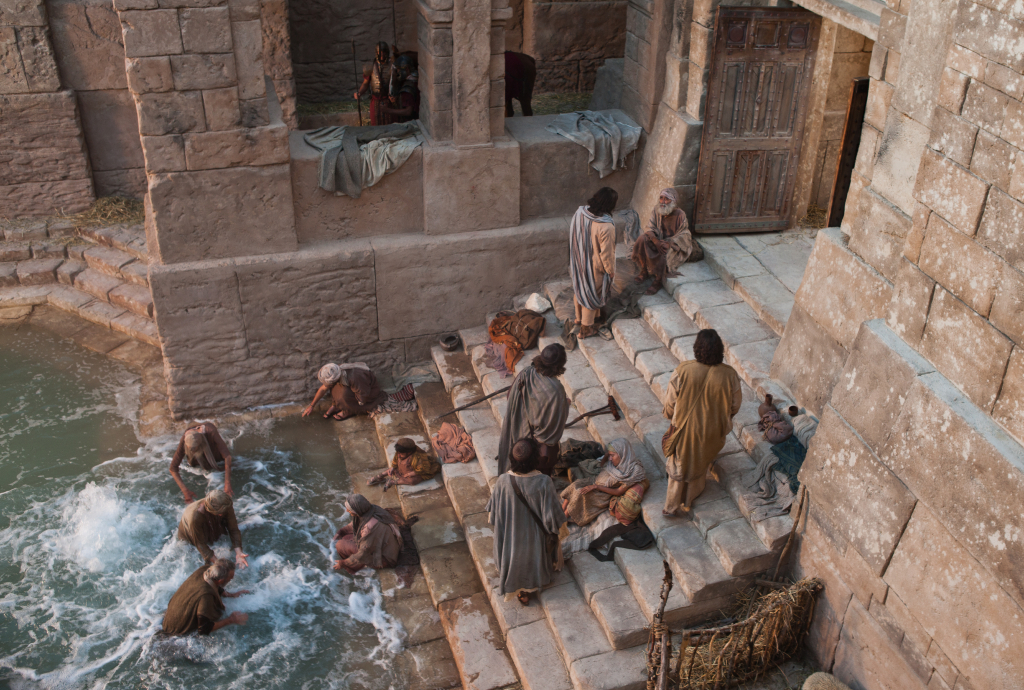Let us imagine a woman named Mariam. She lives in the first half of the first century. Past her prime, Mariam has a painful, disfiguring condition that cripples her. She lives in Capernaum. She hears that, just the day before, a young preacher from Nazareth stood in the doorway of a house owned by a fisherman named Peter and healed every kind of disease. Two grandsons carry her to this Peter’s house early in the morning. A crowd of the infirm has already started to form. Everyone is so hopeful. Jesus is sent for. All morning they wait. As morning passes into afternoon the crowd grows restless, then desperate, then defeated. Jesus never comes (Mark 1.29-39).
Months later Mariam is taken to Jerusalem to the Pool of Bethesda. The legend is that sometimes an angel stirs the waters, and the first one into the pool is healed. The crowd around the pool is just as large and helpless as the one at Peter’s doorway. Day after day they wait. Any time there is the smallest ripple in the water a macabre scramble of the invalids into the pool ensues. One day Jesus appears. Mariam thinks she will finally receive the healing she sought in Capernaum. Jesus approaches the crowd, but looks at only one man. Jesus tells the man, “Get up, pick up your bed and walk!” The man does. Then Jesus goes away without even talking to anyone else. He just leaves them all there by the pool with their pain and hopelessness (John 5.1-14).
Later, when Mariam hears the good news about Jesus she has no doubt He did perform all the miracles they report. She welcomes the message of salvation, and accepts it. Someone with such power must be from God. Something, however, is missing. Maybe it is trust, affection….love. She knows in her head the message is true but her experience keeps her from fully giving her heart to Him. And what of the family who have prayed and cared for her so long – will they ever believe the One who disappointed them so deeply?
* Mariam is a product of our imagination, but she could have existed. The events are exactly as described in scripture. Jesus walks away from a crown of people in need of healing in Mark 1, and walks away from a crowd of invalids at the Pool of Bethesda in John 5. Mariam’s disappointments are not unique. They are universal. We have all prayed for healing that did not come (and healing that did – let us not forget that). We have prayed for others more fervently that we have ever prayed for ourselves. Some for whom we have prayed the hardest we lost anyway. Does this mean we should doubt – if not His power, then His love, His goodness?
Martha does not think so. In John 11 Martha sends Jesus word that her brother is seriously ill. Jesus stays put until Lazarus has died - explaining to his disciples (and to the reader) that He intends to raise Lazarus from the dead. He gives Martha no explanation. In John 11.20-27, Martha meets Jesus on the outskirts of Bethany. Her first words are: “If you had been here our brother would not have died.” Jesus, before raising her brother, or even hinting that He would, asks her if she still believes: “I am the resurrection and the life; he who believes in me shall live even if he dies, and everyone who lives and believes in me will never die – do you believe this.”
Her response is quick and sure: “Yes Lord, I believe completely that you are the Christ, the Son of God, who comes into the world.” Despite her questions her faith is absolute – she believes with her head and her heart. Her faith is not disappointed. Such faith never is. Jesus has not come to Bethany to cure an illness, but to defeat death.
We must remember this. We must remember that questions and disappointments need not destroy faith. Finally, we must remember that faith found only in the head – faith that lacks a beating heart – isn’t faith at all.
